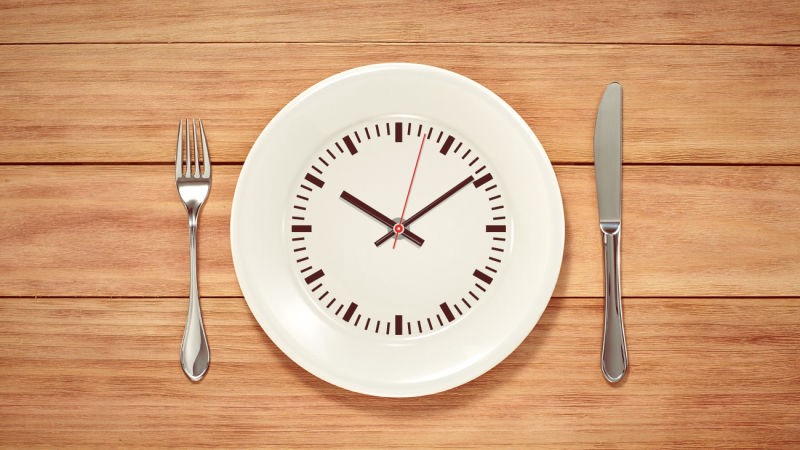How would you like to be able to lose weight, heal your gut, build muscle, balance your hormones, and enjoy many other health benefits?
As research is now showing, this can be achieved by changing the window of time that you eat your foods, which is called “intermittent fasting”. This is not a new concept.
The Greek and Roman warriors would do this as part of their training regimen. They would train all day, scavenge for berries here and there, and then eat one massive meal at the end of the day. They were strong, muscular, energized, and ready for battle.
In the year 1900 Dr. Dewey, MD wrote a book titled The No Breakfast Plan and Fasting Cure. Contrary to western medicine beliefs, even in that time period, the book outlined his various case studies and results showing the effects of both intermittent, one-day fasts, and long-term fasting. Dr Dewey and a group of fellow doctors in the late 1800’s and into the early 1900’s helped create a cultural shift towards the importance of personal hygiene and caring for your body.
Even relevant today, your body will innately go into a state of fasting when needed. For example: when you have an illness you tend to not want to eat and that is why drinking plenty of fluids is so important.
What is Intermittent Fasting?
Intermittent Fasting is when you consume the same amount of calories that you would in a typical day but in a shorter window of time. This means you are consuming your normal 2000 calories in a 6-8 hour window, and during the other 16-18 hours you are fasting.
This is where basically you are skipping breakfast and then eating lunch and dinner. Intermittent fasting is not about binge eating followed by starvation or any other extreme form of dieting. Rather, it involves timing your meals to allow for regular periods of fasting. Long-term fasting/caloric restriction has always been criticized for muscle loss and nutrient depletion. This is why it is not recommended for weight management and why unhealthy individuals struggle to fast long enough to receive the healing benefits. Intermittent fasting removes this problem. It spares your lean muscle mass, maintains nutrient levels, positively affects hormones involved in weight loss (leptin, insulin, and ghrelin), and renews brain cells.
Benefits of Intermittent Fasting
- Reduces inflammation
- Improved hormone sensitivity (insulin, leptin, ghrelin)
- Helps heal your gut and microbiome
- Increases growth hormone
- Metabolize fat for fuel
- Improve mitochondrial output = more energy
The standard American diet is high in processed foods, grains, sugars, and bad fats which create cellular inflammation and hormone insensitivity. Inflammation blocks the hormone receptors on the cells. Even though the hormones are there, the body can’t use them because they are not able to get their message to the cells.
One of the positive benefits of intermittent fasting is that it helps to increase hormone sensitivity. This allows your hormones, such as insulin, to work the way it was intended and with greater efficiency.
Three important hormones that help your cells to hear are leptin, ghrelin, and insulin. Leptin is the hormone that tells your brain if you are hungry, if you are full, and to burn fat when not eating. Ghrelin is the hormone that tells your brain that you are hungry. Insulin pulls sugar from the blood stream into your cells. Following a Primal/Paleo-style diet will improve the success of intermittent fasting. You will not get the desired results if you binge on junk food or gorge on a pizza.
Intermittent Fasting and Exercise
Intermittent fasting will naturally increase your growth hormone (GH) levels, and when you add a burst or surge workout, this will also increase GH levels. GH is known as the fitness hormone because is plays an important role in building muscle and burning fat.
The American College of Cardiology in New Orleans showed that fasting triggered a 1,300 percent rise of human growth hormone (HGH) in women and an astounding 2,000 percent in men.
Focus on building lean muscle mass which will increase your basal metabolic rate and quicken fat metabolism. High-intensity short duration exercise used in a pattern with aerobic exercise has been shown to have a healthy effect on hormones and will enhance the results with your intermittent fast.
Intermittent Fasting and Leaky Gut
Increased intestinal permeability, aka “Leaky Gut”, can cause increased inflammation, digestive issues, hormonal and brain imbalances, and autoimmune disorders. Utilizing intermittent fasting will help heal a leaky gut because you are not constantly snacking or eating which allows the gut microbiome to rebalance. Our gut has a difficult time healing when it constantly is digesting food.
Multiply that with a standard American diet high in sugar, will lead to feeding candida yeast in the gut resulting even more leaky gut symptoms. When you are only consuming your food during 6-8 hours window of time, you have 16-18 hours of time for the gut to repair and heal.
This short fasting time frame is mostly done when you are sleeping and will help reset the microbiome in your gut by starving down candida yeast and other pathogens. It will change your metabolism from being a sugar burner to a fat burner.
This goes against diet books that talk about eating 6 small meals a day. When you eat this way, you are training your body to constantly being in need of calories and most of the time those calories are sugar if you are not following a clean diet. This will further drive your hormones out of balance. It takes the average person 8-12 hours to burn through sugars stored in body, so utilize the time you sleep to get you there faster.
When and how often?
The best time to eat is later in the day. So if you are eating in a 6-8 hour window, you want to start eating at 12:00pm or later and be done at 6:00pm-8:00 pm. There are a few reasons for this.
First, your digestive tract and liver are in absorbing and re-building mode at night. In the morning your liver and digestive system are in excreting mode, which is the most common time to have a bowel movement.
Second, after you eat a big meal you naturally will become tired thus getting you ready to fall asleep for the night. Last, a big portion of the fasting is done while you sleep.
It is important then, to consume enough water in the morning to help the detoxification effect and re-hydrate the cells. Adding in some Himalayan sea salt will keep your metabolism and energy up and help you avoid fatigue and brain fog.
Here is an easy way to transition into intermittent fasting:
- Phase 1- Stop eating after dinner no later than 8pm
- Phase 2- Stop eating after 8pm and drink a high protein smoothie with MCT oil in the morning
- Phase 3- Skip breakfast and have a light to medium portion lunch and a bigger dinner
Contraindications
While intermittent fasting can be a powerful tool, there are several conditions that should take the approach slowly; adrenal fatigue, thyroid conditions, autoimmune disorders, and methylation defects.
People with these conditions can do intermittent fasting, but need to be cautious in their approach due to the initial stressful effects on the body organs.
Women, especially, need to be cautious due to the fluctuations of hormones throughout the month.
It is recommended that anyone interested in intermittent fasting or fasting of any type work with a natural medicine practitioner that is knowledgeable in this field before beginning.


